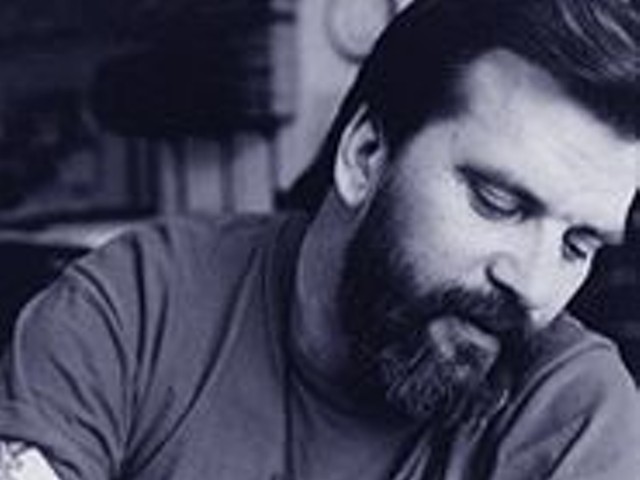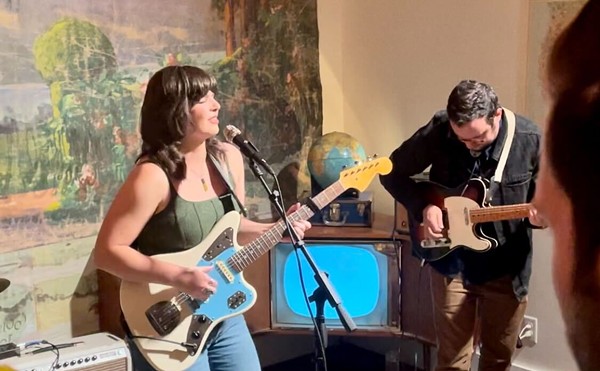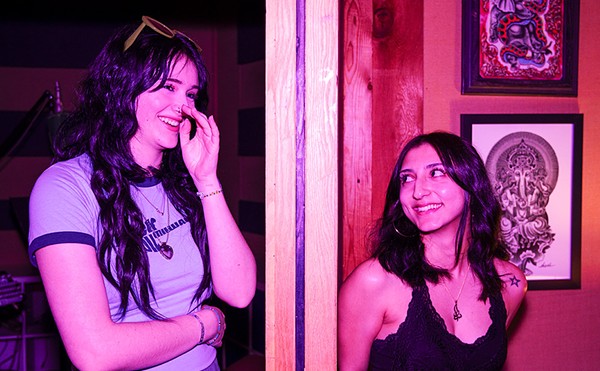"It's just not fun anymore," Dawson says. "We have to go in on Mondays or Tuesdays, and it's hard to get people out on weekdays. So much is competing for people's money. I just want to back off a bit; it's become more business than I wanted it to." Oddly enough, Dawson is enjoying some of his widest acclaim and notoriety, at least since his first flirtation with rock & roll hitdom in the late '50s and early '60s. Last year he released one of his strongest albums, More Bad Habits (Yep Roc); Crystal Clear has gathered up his earliest slabs of wicked proto-rockabilly on Rockin' Bones: The Legendary Masters; he's become a celebrity in Europe, where his every two-minute single is pored over like a Dead Sea Scroll; he's played Carnegie Hall and Lincoln Center in New York; and Conan O'Brien has all but talked him into fronting the Late Night house band.
In the salad days of rock & roll, however, Dawson never really made it, though he was more than good enough. His first public performance was with his father in church, "beating on the arm of a chair because I didn't have an instrument," and his first paid gig came around 1957, filling in for Ray Sharp in a little Fort Worth club called the Penguin. "I was probably 18 or 19," Dawson says. "I looked like I was 14, so I had a rough time getting into clubs. At that first gig, I used Sharp's rhythm section, doing a trio thing. I couldn't really find a lead player, so I did my own leads. I wore myself out. After that, I went up to Ronnie Hawkins' club in Fayetteville. That was in the early '60s. The Hawks, who would become the Band, did alternating weekends with us. We never got to see Ronnie much, but Levon Helm and Robbie Robertson would come see us. It was a college hangout. All the kids wanted to hear was Bo Diddley, so we drove that old Bo Diddley into the ground. It was mostly fraternity guys, but I was at that age where I wanted to see some girls! That lasted about a summer."
As a guitarist, Dawson combines the rhythmic intuition of an Eddie Cochran with the light touch of a Scotty Moore and the swampy rock of "Okie Doke Stomp"-era Clarence "Gatemouth" Brown. "The first guy I heard play that kind of guitar was Gatemouth," Dawson says. "I lived in Waxahachie, and not too far from there was a town called West Station. Gatemouth used to play at the Night Owl. No way could I get in, but we used to go down and stand in the parking lot. Sometimes they'd open the door and I could see Gatemouth's guitar."
Dawson's first real break came as a teenager on the Dallas-based Big D Jamboree, a live radio program à la the Grand Ole Opry. "We appeared on the talent contest," Dawson remembers, "and the strange thing was that 80 or 90 percent of the people there were exactly the same ones who came every Saturday night. And they didn't like everything. It was a country audience, but at the time, they liked some of the rock & roll bands, but a lot of them they didn't. You had to win the contest 10 times in a row. Then you got a record contract and a management offer." Dawson did well enough that he eventually signed with Gene Vincent's manager, Ed MacLemore, and released the now-legendary rock & roll singles "Action Packed" and "Rockin' Bones." The records were fresh and fast -- and that's exactly the speed at which they arrived nowhere.
"It was a very frustrating thing," Dawson says. "'Action Packed' never really got any momentum. They only pressed 1,000 copies. I had some dealings with Don Robey -- he was a big, black Uncle Tom entrepreneur. He was this prominent, intimidating man. I had already cut the record; he just bought it. The record pretty much only got played on black stations. I was doing all these black record hops, and I was probably the whitest person they'd ever seen. I should have been scared, but I wasn't, and in the end I really had no reason to be. But there was always this mystery, not really knowing what happened, why things never took off.
"Then we were signed by Swan to become the next big thing, the next blond-headed guys from Texas," Dawson continues. "Dick Clark probably had his hand in that label. It wasn't publicized, but Swan's records were pushed real hard on (American) Bandstand. But then payola came along and put an end to all that." That's as close as Dawson got. His biggest-selling single, "Ain't That a Kick in the Head," wasn't even real rock & roll. "It was a rockin' song but a novelty tune," he explains. "At that time, they were trying to soften all the rock & roll. I don't care what anybody says, it was a plan to soften the music. It got lots of airplay, but it was what they call a turntable hit. It probably never got any higher than 100 on the charts."
Why, then, does Dawson's music still matter; still, simply put, rock? He's an expert guitarist with a classic rock & roll voice and also a demanding bandleader. "I have a problem with undisciplined music," Dawson says. "It should be fun, but it should have dynamics, be in tune, and the beat shouldn't be turned over. That's an unpardonable sin for me, turning the beat over." Most important, Dawson has that elusive rock & roll charisma -- no amount of volume, speed or greasy festooning can make up for it. His vitality and sense of joy are as unself-conscious as they are boundless. He's not really a songwriter: The songs he most often picks couldn't be sillier -- "I tell people to write me some graveyard songs, or songs about motor-sicles, or wild women, or junk food; it's the furthest thing from my philosophy" -- but his ability to magnetize a ditty couldn't be more serious. In conversation, he's a thoughtful, sincere, even peaceful man -- Dawson is writing a book, tentatively titled Who? -- as genuine as a '63 Stratocaster. In front of a crack rhythm section, in a beer joint just big enough for dancing, he'll be gone, seriously gone.
"I don't call what I do rockabilly," Dawson says. "To me, it's rock & roll. Rockabilly was from that time period when Elvis didn't really have a drummer, when he was doing 'That's All Right Mama,' or early Carl Perkins, when W.S. Holland was beating on the side of his bass with sticks. It's a softer thing. My shows are more holy rollin', like that old-time religion in Assembly of God churches. My shows still have teeth, but I like to see people smiling, see people hug one another. That's what I'm about."





